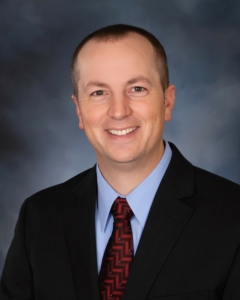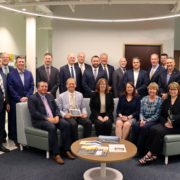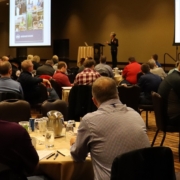From the Fields: Leading to Prosperity
 By Nicholas Felder
By Nicholas Felder
I’ve been reading Capitalism in America (2018) by former Federal Reserve Chairman Alan Greenspan and Adrian Wooldridge and it actually surprised me about the size and scope of many of the economic growths our young country has had. It’s a good read if you have the time (nearly 600 pages), but long story short, nearly all of the periods of economic prosperity in the U.S. have been driven by businesses leaders looking to change their industries by taking a new or good idea and making it better. This initially causes chaos, but generally results in a rebirth of prosperity. All of these periods were generally led by a single person or a host of individuals whose expertise and knowledge were relied upon to lead the charge.
Opportunities that I’ve been asked to review over the last 12 months include vertical integrations, horizontal acquisitions, repair versus replace, and R&D to either create new business lines or add value to existing ones; creative destruction in its finest. Requests for liquidity have been minimal due to the profitability of most operations and the governmental assistance of others. These opportunities came from some of the most unlikely operators: some with little experience in the new ventures and some attempting to pivot back into old business lines to adjust to the new post-COVID economy. My job, like all of yours, isn’t to tell people if the opportunity will succeed or fail, but to be an advisor and assessor of risk and how that risk might be mitigated by our customer or prospect.
SBA, USDA, FSA loan and guaranty programs are all time-tested vehicles for reducing repayment risk. Energy efficiency grants through energy providers or the USDA’s REAP grant can be a ton of paperwork that may need professional grant writers or facility auditors to complete but may provide significant equity capital that may reduce collateral risk and reduce debt service requirements. Guarantors, individually or corporate, may reduce the performance risk through guarantee of payment or addition of collateral. But how many of us in our peer group adequately assess the operational or human risk? I know that I sometimes glaze over the need to ask: “Who’s the next person up if you can’t perform your duties tomorrow?” or “When you look to cash out and retire in 3–5 years, do you have an identified buyer or plan?” We assume the president or CEO will be there for the long haul.
Within that same 12 months, I’ve had a business owner be diagnosed with brain cancer; I’ve had a farmer look to encourage a more owner-like mentality by bringing a non-familial key employee into ownership through a stock bonus/gift (where there’s limited next-generation prospects); I’ve had a grain farmer look to add efficiencies and add value to the product he sells through expansion during the current near-recessionary period. All these high-level business owners exhibit an “executive mindset no matter the size of the operation” which is a key success factor of Dr. David Kohl of Virginia Tech. All of these owners are in the trenches every day turning wrenches, driving equipment, handling materials, handling the HR duties, and purchasing raw materials. However, they take time to step back to assess the long-term consequences of decisions that are or will be made on the long-term viability of the business. When they call to discuss an idea, it is often the 100th iteration they’ve assessed and the likelihood of success is very high (which makes my job a little easier).
Recessionary periods weed out the weakly capitalized, those with lean cashflow, and those who don’t take those steps back to see the whole picture before making those trajectory-altering decisions. The word “recession” seems to have only negative connotations within the general public, but so does “spring cleaning” in my own home. Both are a means of reset, renewal, and setting the stage for an anticipated revival. In banking, recessions often tighten credit standards and the need to dot all the I’s and cross all the T’s that often get glazed over during times of good fortune — including the assessment of human capital in business. I’m unsure that the current soft landing will establish these resets, but I encourage all the bankers in the industry to do a little spring cleaning of your processes and procedures and ask a few more hard or maybe uncomfortable questions to ourselves and our customers with the premise of better service and being a stronger advisor.
Have a great fall season!
Felder is vice president – commercial and agricultural banking at MidWestOne Bank in Lancaster. Felder also serves on the 2023–2024 WBA Agricultural Bankers Section Board of Directors.










